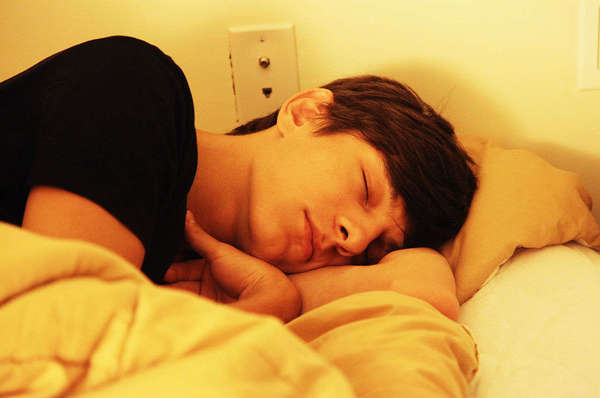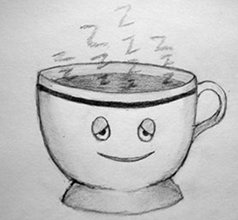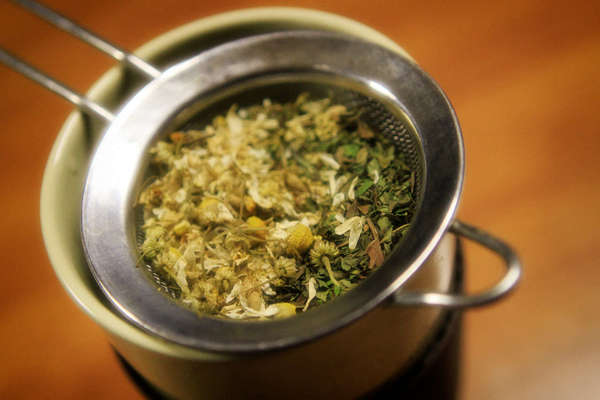Tea and Sleep
Last Updated: Mar. 22, 2017
 The caffeine in tea can contribute to insomnia, but tea is less disruptive of sleep than coffee, and may carry some sleep benefits. Photo © Sasha Kargaltsev (Flickr), CC BY 2.0.
The caffeine in tea can contribute to insomnia, but tea is less disruptive of sleep than coffee, and may carry some sleep benefits. Photo © Sasha Kargaltsev (Flickr), CC BY 2.0.Herbal teas, however, are a different story. Many herbs have positive effects on sleep and relaxation. Herbal teas are diverse; we discuss them in a separate section at the end of this article.
Caffeine's disruption of sleep
Caffeine is a central nervous system stimulant, and has been shown to interfere with sleep.[1] Caffeine is widely perceived to boost alertness and performance at various tasks, but a review of the scientific literature found that caffeine does not actually boost performance, but merely restores performance degraded by sleep loss.[1]Consuming caffeine closer to bedtime is especially likely to disrupt sleep. Insomnia and sleep loss can have major impacts on health and ability to function, negatively affecting concentration, creativity, and immune system function. Michael J. Breus, WebMD's expert on sleep medicine, notes that caffeine can stay in your body's systems for up to 12 hours after consumption, and recommends avoiding caffeine within 4-6 hours of bedtime.[2] The Mayo Clinic also recommends to limit your caffeine intake to less than 400 mg per day (5-10 cups of tea or 3-4 cups of coffee) as higher amounts can cause insomnia and other problems.
Different people have varying levels of sensitivity to the effects of caffeine. Some people are able to consume large quantities without any noticeable adverse effects, whereas others may struggle with insomnia even at much lower doses. According to the Mayo Clinic, men are on average more sensitive to caffeine than women. Especially sensitive groups include people taking medications such as Ciprofloxacin (Cipro) or norfloxacin, or certain herbs, including Echinacea.
After only a few days of regular use, the body develops a tolerance to most of caffeine's effects, and thus the most severe sleep disruption is likely to be experienced when people who are unaccustomed to caffeine are exposed to it, or on days when people consume a larger amount than usual. However, population studies have also found negative effects on sleep for people who habitually consume caffeine.[1]
Tea has benefits for sleep, especially when compared to coffee
 Artwork by Gretchen Spencer
Artwork by Gretchen SpencerTea consumption may have some other sleep benefits as well. Tea contains L-theanine, an amino acid derivative. Theanine on its own has been shown to promote relaxation,[4] and a study in rats found that it partially counteracts the sleep disturbances induced by caffeine.[8] Theanine has also been studied as a supplement to improve sleep quality; one study of boys with ADHD, a population who can suffer from insomnia as a side effect of prescribed medications, found theanine to be safe and effective at improving some, but not all, aspects of sleep quality.[9]
One study found that the antioxidants in green tea may prevent some of the damage due to sleep apnea, a common sleep disorder, although it is not clear if tea has any potential to prevent or treat the disorder itself.[5]
Herbal teas & sleep
 Chamomile is a common herb used in bedtime blends; it can be mildly relaxing and may help with sleep. Photo © FromSandToGlass (Flickr), CC BY 2.0.
Chamomile is a common herb used in bedtime blends; it can be mildly relaxing and may help with sleep. Photo © FromSandToGlass (Flickr), CC BY 2.0.Some herbs, such as valerian and kava, have sleep-inducing effects. These herbs have been researched for their potential to improve sleep quality and/or treat sleep disorders and have some evidence supporting their use for this purpose.[6] Other herbs such as chamomile, lavender, hops, lemon balm and passionflower, which have more general relaxing effects, have been studied somewhat, but more research is needed to draw conclusions about their effects on sleep.[6] We have an article exploring chamomile tea and sleep in detail.
Valerian and kava, however, are powerful drugs and are not necessarily safe for casual use as a beverage, whereas many other herbs like lemon balm and chamomile are generally safe to use in such a manner. Although its overall effects on sleep are inconclusive, chamomile, a favorite ingredient in teas consumed before bedtime, has been shown to promote relaxation.[7]
Other recommendations for sound sleep
Tea is only one of many factors that can influence quality of sleep. The American Sleep Association has a variety of tips for promoting quality sleep, including maintaining a constant sleep schedule, getting regular exercise, but avoiding vigorous exercise close to bedtime, and keeping your sleep schedule relatively constant. The National Sleep Foundation has similar recommendations, also including ensuring adequate exposure to natural light during the day.Blue light, such as that given off by smartphone and laptop screens, can also be a factor, according to Harvard Health. Avoiding these devices before bedtime, and/or using apps that lower the color temperature at night, can thus promote healthier sleep.
References:
1. Timothy Roehrs, Thomas Roth, Caffeine: Sleep and daytime sleepiness, Sleep Medicine, Vol. 12, No. 2, pp. 153-162, Apr. 2008.
2. Michael J. Breus, 12 Tips for Better Sleep in Bad Times, WebMD Health News, Oct. 4, 2001.
3. I. Hindmarch et. al. A naturalistic investigation of the effects of day-long consumption of tea, coffee and water on alertness, sleep onset and sleep quality, Psychopharmacology, Vol. 149, No. 3, Apr. 2000.
4. Russ Mason, 200 mg of Zen: L-Theanine Boosts Alpha Waves, Promotes Alert Relaxation, Alternative and Complementary Therapies, Vol. 7, No. 2, pp. 91-95, Apr. 2001.
5. Kelli Miller Stacy, Green Tea Puts Sleep Apnea Woes to Bed?, WebMD Health News, May 16, 2008.
6. Charlotte Gyllenhaal et. al., Efficacy and safety of herbal stimulants and sedatives in sleep disorders, Sleep Medicine Reviews, Vol. 4, No. 3, pp. 229-251, Jun. 2000.
7. Moriya Kiyoshi et. al. Correlation between the indices of autonomic nervous system and mood after drinking chamomile tea. Japanese Journal of Biofeedback Research, Vol. 28, 2001.
8. Hwan-Soo Jang et. al. L-theanine partially counteracts caffeine-induced sleep disturbances in rats, Pharmacology Biochemistry and Behavior, Vol. 101, No. 2, April 2012, pp. 217–221.
9. Lyon, Michael R., et al. The effects of L-theanine (Suntheanine[R]) on objective sleep quality in boys with attention deficit hyperactivity disorder (ADHD): a randomized, double-blind, placebo-controlled clinical trial., Alternative Medicine Review, Dec. 2011, pp. 348+.

